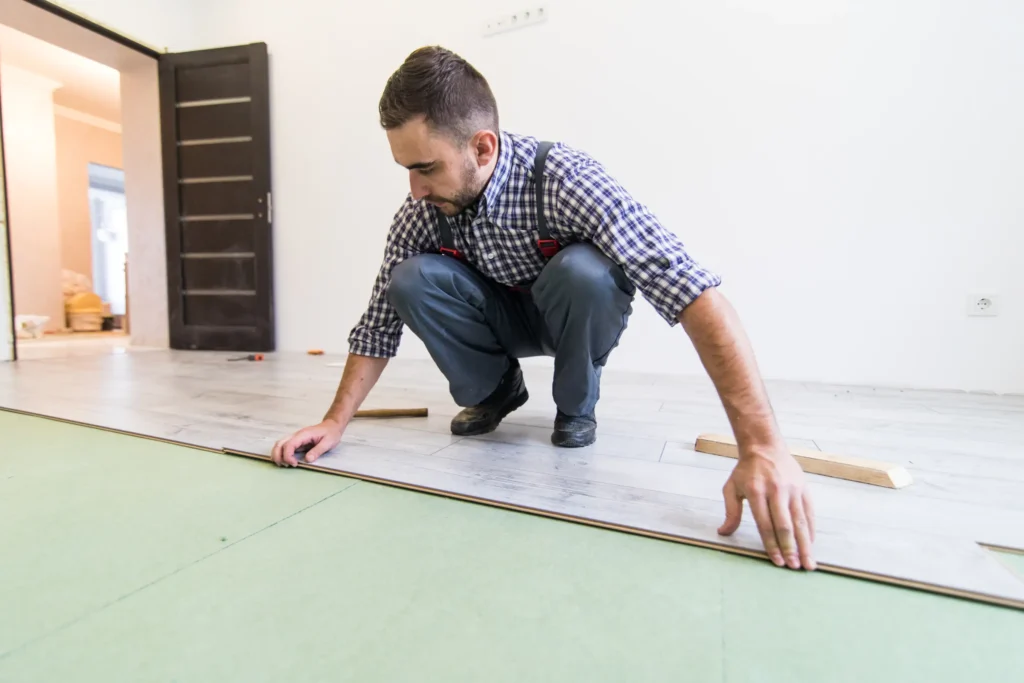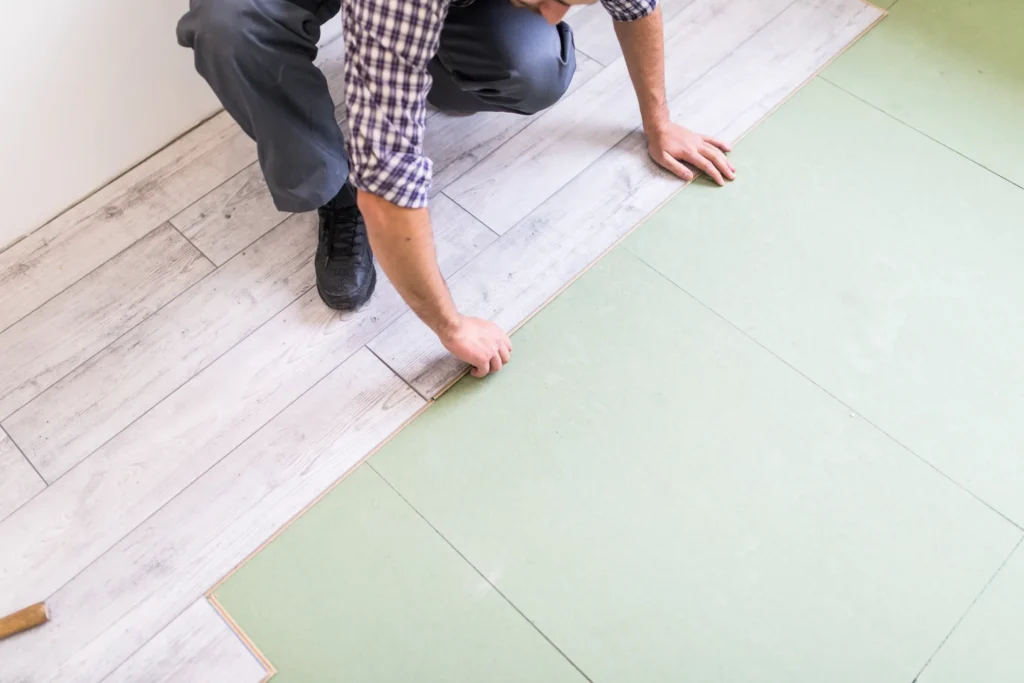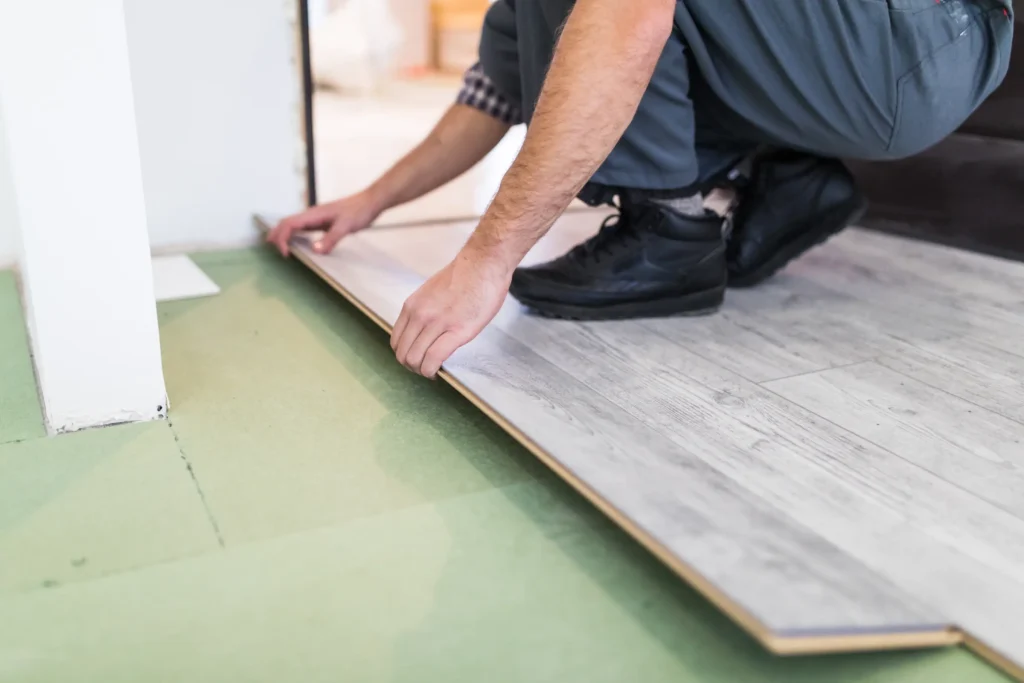- 10% Off Flooring Services
- Free Estimates

✔ Vinyl flooring offers a cost-effective way to achieve a stylish, durable finish.
✔ Project costs depend on materials, labor, and site conditions.
✔ Most installations take just a few days to complete.
✔ Professionals deliver faster, longer-lasting results than DIY installs.
✔ Planning and choosing reliable contractors keep budgets on track.
Thinking about upgrading your floors? Vinyl flooring offers the perfect blend of affordability, style, and durability — but understanding the true installation cost can help you avoid surprise expenses and make smarter choices for your home or business.
Here’s a breakdown of everything from material and labor costs to timelines, maintenance tips, and flooring alternatives, all backed by professional insight and experience.
In 2025, standard vinyl plank flooring costs between $2 and $7 per square foot for materials, while luxury vinyl planks (LVP) or tiles (LVT) range from $3 to $10 per square foot. Professional labor adds another $3 to $10 per square foot, depending on the complexity of the job.
For a 1,000-square-foot project, expect to spend between $5,000 and $17,000, including materials and installation.
The price varies based on the quality of the vinyl, your region, and whether you opt for click-together planks—a floating floor system that can be installed over existing flooring, eliminating removal costs of about $1–$2 per square foot.

No two flooring projects are alike. Costs can increase due to:
Uneven or damaged subfloors require extra prep work to ensure a smooth, stable surface for installation.
Rooms with tight corners, stairs, or irregular shapes take more time and precision, which can increase labor needs.
Soundproof underlayment, custom transitions, or decorative trim can enhance quality and comfort but add to the overall project scope.
Moving heavy furniture or removing old materials often adds time and effort before new flooring can be installed.
Professional flooring contractors can typically complete 1,000 square feet of vinyl flooring in one to three days. The exact timeline depends on whether the installation is floating, glued down, or patterned
DIY projects may take three to five days or longer, especially for beginners. While the process isn’t overly complicated, professionals often achieve smoother finishes and better long-term performance.
Timing depends on the installation type:
Avoid placing furniture or cleaning with water during this time — letting the floor set properly ensures maximum durability and prevents early wear.
DIY installation can be a rewarding weekend project if you’re handy and have the right tools. You’ll save on labor, but mistakes in cutting or alignment can lead to costly issues later.
Hiring professional flooring contractors, like Carmel Flooring Company, on the other hand, guarantees a precise, high-quality finish and can speed up the process significantly. Experienced installers also handle subfloor prep, disposal, and cleanup — all while ensuring your flooring warranty stays intact.

If vinyl isn’t quite right, explore these other high-performing flooring types:
 Rubber Flooring
Rubber FlooringRubber flooring is an excellent choice for gyms, factories, and other active environments. Known for its durability and traction, it provides a slip-resistant surface that enhances safety in high-traffic areas. Easy to clean and maintain, rubber flooring ensures long-lasting performance in both commercial and industrial flooring applications.
 Engineered Wood Flooring
Engineered Wood FlooringIt brings the warmth and timeless appeal of real hardwood to any space. Designed with layers for added stability, engineered wood flooring resists moisture and temperature changes better than solid wood. Ideal for offices, retail stores, and upscale interiors, engineered wood flooring offers both luxury and practicality.
 WPC Flooring (Wood Plastic Composite)
WPC Flooring (Wood Plastic Composite)WPC flooring is built for performance, combining strength, comfort, and sound absorption. Resistant to scratches, spills, and humidity, WPC flooring is a reliable option for high-traffic environments. With quick installation and easy maintenance, it supports busy commercial spaces where durability and style matter most.
 Resin Flooring
Resin FlooringResin flooring delivers a seamless, ultra-tough surface ideal for industrial flooring environments. Known for its chemical resistance and longevity, resin flooring can withstand heavy machinery and demanding conditions. Available in various finishes,i t provides a sleek, professional look for modern industrial flooring and commercial settings.
Yes, it can be placed over clean, level surfaces like tile or laminate. Floating planks are ideal for this setup. Always ensure the base is stable before installation.
Sweep regularly and mop lightly when needed. Avoid harsh cleaners or too much water. Felt pads help prevent surface scratches.
Many modern options use recycled content and low-VOC adhesives. Some can even be recycled later. Look for sustainability certifications when purchasing.
Prolonged sunlight can cause fading. Use curtains or UV-resistant finishes to protect color. Newer vinyl types are made to resist discoloration.
Yes, if the weight isn’t distributed properly. Add floor protectors and avoid dragging items. Rotate furniture occasionally to prevent dents.
Vinyl flooring projects in Carmel, NY, deserve skilled hands and reliable expertise. Carmel Flooring Company delivers precision installation, premium materials, and professional service designed to meet both residential and commercial flooring needs. Every project is completed with care—from accurate measurements to flawless finishing—ensuring long-lasting style and performance across any space in Carmel, NY.
Contact Carmel Flooring Company today to schedule a consultation and get a detailed flooring estimate in Carmel, NY.